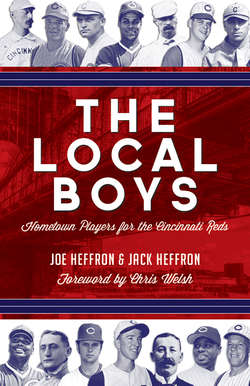Читать книгу The Local Boys - Joe Heffron - Страница 26
На сайте Литреса книга снята с продажи.
MIKE BURKE
ОглавлениеNOVEMBER 30, 1853–JUNE 9, 1889
Major League Career
MAY 1, 1879 – JULY 19, 1879
Time as a Red
1879
Position
SHORTSTOP
FANS HEAR ALL TOO OFTEN that baseball is a mental game, but some clichés stick around because they’re true. And for infielder Mike Burke, that truth was painfully apparent during his very short major league career in 1879. Though a gifted athlete, he played poorly, and the culprit might have been his trying too hard to succeed. In his book Major League Baseball Profiles, David Nemec notes that Burke and his wife had a daughter that summer, quoting Enquirer columnist Opie Caylor’s theory that perhaps the pressure to succeed to support his young family simply overwhelmed Burke.
He was born in New York but grew up somewhere in Cincinnati, maybe in the Cumminsville area. He played shortstop for the amateur Cumminsville Blue Stockings from 1873 to 1875, before beginning his pro career in 1877 with the Columbus Buckeyes. After a strong season with the London (Ontario) Tecumsehs, Burke signed with the Red Stockings, who were building a powerful team in hopes of winning the pennant. Many publications made them preseason favorites, though the New York Herald sounded a sour note: “Cincinnati expects great things of its fancy-priced, high-salaried team for 1879 … [but] there is a strong incompatibility of temper among some of the members of the nine, which may break out as it did in 1878.” The year before, the team stood atop the league until fading to second place, apparently due to dissension among the players.
A slick fielder who could hit, Burke debuted with the Reds on May 1, 1879, playing shortstop, and his poor performance was a sign of things to come. He went hitless in five at-bats, while also committing an error. Unfortunately, this would prove to be one of his better games. During his two-month major league career, he committed 32 errors in 28 games, often making wild throws to first baseman Cal McVey. Of course, in those bare-handed days, errors were very common, but they were even more common with the Red Stockings, who made 450 of them in 82 games.
The Enquirer forgave Burke’s rough start, reporting in early May that he is “a little nervous … but he will settle down soon and astonish people.” The paper did criticize his penchant for not running hard when he grounded into obvious outs, stating that as a fast runner he might force a hurried throw if he tried and that his lack of hustle “takes badly with an audience.” Still, Burke’s fielding gaffs may have caused him to put further pressure on himself, which caused the Enquirer to report, “Instead of doing better, [he] seems to be doing worse. He is nervous to a degree and seems entirely lacking in judgment.” According to Nemec, the Enquirer’s Caylor later wrote that Burke’s teammate, Will Foley, exacerbated the situation by constantly jabbing the rookie with sarcastic comments, probably to keep the new guy off his game and thereby away from Foley’s job. Perhaps the Herald’s prediction of conflict among the players was right after all.
Burke spent time at third base and in the outfield, as well as at shortstop, but struggled at every position. He also hit just .222 in 119 plate appearances. By midsummer, with the highly touted Red Stockings struggling, management had seen enough. When Burke showed up to the ballpark on July 21 for an exhibition game, team secretary Con Howe handed him his release. Burke finally snapped. He lunged at Howe but was restrained by a policeman. He then ran onto the field where some of the players already were practicing and challenged player-manager Cal McVey to a fight, shouting, “I can lick you” before attacking him. Players rushed to the scene and pulled Burke away, escorting him to the locker room, where he suddenly burst into tears. Before leaving, he apologized, the Enquirer adding that “nobody speaks of him in other terms than of kindness.”
Burke appears to have played shortstop briefly in the non-affiliated National Association in 1880, most likely for the team in Rochester, but then he left baseball behind. According to a later article by Caylor, cited by Nemec, Burke found success as a businessman in Albany until his early death at 35.
